Starbucks opened its first store in Medellín on September 1. I happened to be in El Poblado on this day so I had the opportunity to visit on its opening day.
The new Starbucks is located right next to the Krispy Kreme that opened in March. Starbucks is located in a new building in El Poblado along the Milla de Oro (Golden Mile). This is a short distance from the Papa John’s Pizza, which opened in September last year.
Starbucks reportedly worked with a range of local designers to capture the artistic, creative and modern spirit of Medellín in the new store. The new Medellín store was designed with an open, airy and welcoming layout, which includes community tables and an outdoor patio.
There was a short line at the new store in Medellín when I went on its first day. This was nothing like the line at the company’s first store in Colombia, which I understand on its opening day in 2014, had people waiting for hours in a line that stretched outside the door and along the street.
Starbucks originally entered the Colombian market back on July 14, 2014 with its first store in Bogotá. I happened to be in Bogotá two weeks after its first store in Colombia opened and I wrote about it on this website.
Starbucks now has 10 stores in Bogotá and the new Medellín store is its 11th in Colombia. The company plans to open five more stores in Medellín by the end of next year and 50 stores in Colombia by 2019
Starbucks’ business in Colombian market is a joint venture with Alsea and Grupo Nutresa. Alsea is a big restaurant operator in Latin America running several brands including Burger King, Domino’s Pizza and P.F Chang’s.
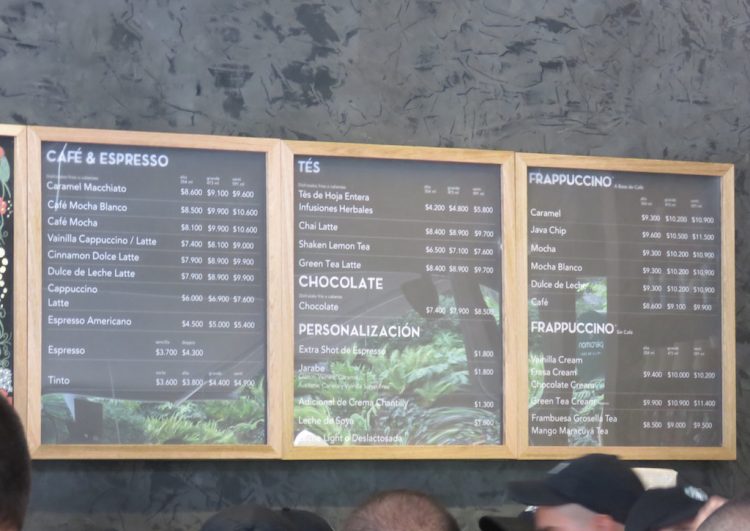
The Menu at Starbucks
The menu at the store includes Coffee, Espresso, Teas, Hot Chocolate and Frappuccino.
Black coffee (tinto) comes in four sizes ranging in prices from 3,600 pesos to 4,900 pesos.
An American Espresso costs 4,500 pesos for a small, 5,000 pesos for a medium and 5,400 pesos for a large.
Hot Chocolate costs 7,400 pesos for a small, 7,900 pesos for a medium and 8,500 pesos for a large.
Caramel Frappuccino costs 9,300 pesos for a small, 10,200 pesos for a medium and 10,900 pesos for a large.
Like most Starbucks the new store in Medellín has free Wifi. I saw several customers with computers in the store using the Internet.
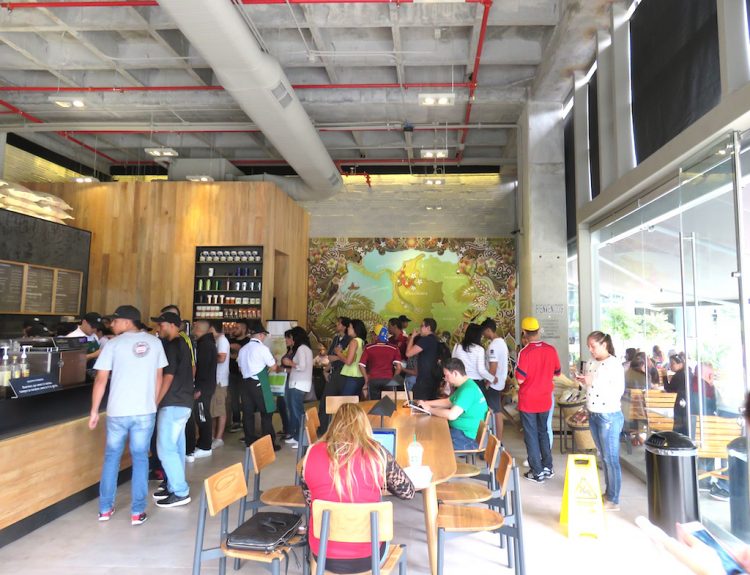
Starbucks in Latin America
Starbucks is a massive company with over 23,000 retail stores located in 65 countries. The company has been in Latin America since 2002 starting out in Mexico and Puerto Rico. The company now has 1,000 stores in 13 countries in Latin America and the Caribbean.
Starbucks opened its first store in Mexico 15 years ago and the company now has over 430 stores in Mexico.
Currently, Starbucks in Colombia reportedly generates 160 direct jobs. The projection for the company is to reach up to 1,000 jobs when its goal of 50 stores is completed by 2019.
The company expects that it will likely enter another city in Colombia next year. My bet is this likely will be in Cartagena.
Starbucks buys about 400 million pounds of coffee per year and more than half of that comes from Latin America, mainly from Colombia.
Starbucks claims its stores in Colombia serve 100 percent locally sourced and roasted coffee for in-store beverages to honor the country’s coffee heritage and the company’s 45-year history of sourcing premium arabica coffee from the region.
In Colombia, Starbucks competes with Juan Valdéz with over 200 stores in the country. Juan Valdéz has stores in 16 additional countries including the United States.
Juan Valdéz’s response to Starbucks’ initial store in Bogotá, Colombia was to open a café in downtown Miami. Juan Valdéz now has six cafés in Maimi and is looking to open more in South Florida.
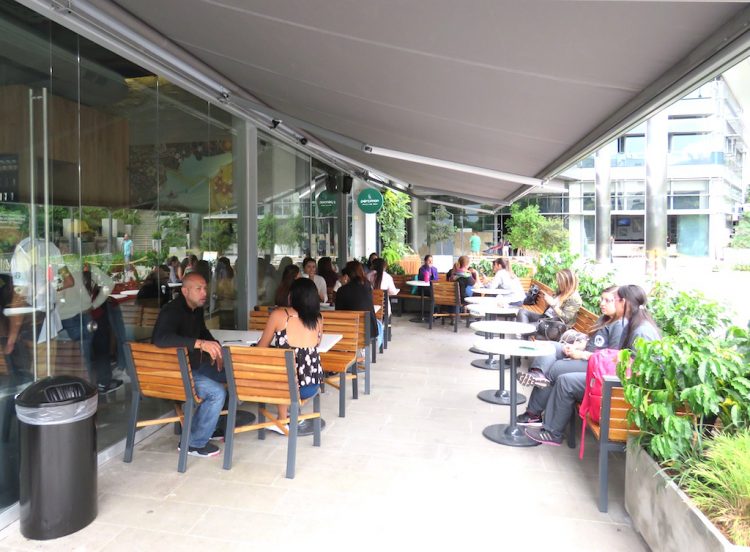
Which U.S.-based Chain is Next for Medellín?
Medellín has several U.S.-based chain restaurants and fast food places including Burger King, Dunkin’ Donuts, Hard Rock Café, Hooters, McDonalds, Subway, KFC, Domino’s, Papa John’s, Krispy Kreme and now Starbucks.
Bogotá has many more U.S.-based chain restaurants that aren’t available yet in Medellín, including Pizza Hut, Chili’s, TGI Fridays, P.F. Changs and Taco Bell.
I suspect that we may see at least a couple more U.S.-based chains open locations in Medellín over the next few years, with these most likely being U.S.-based chains that are already operating in Bogotá.

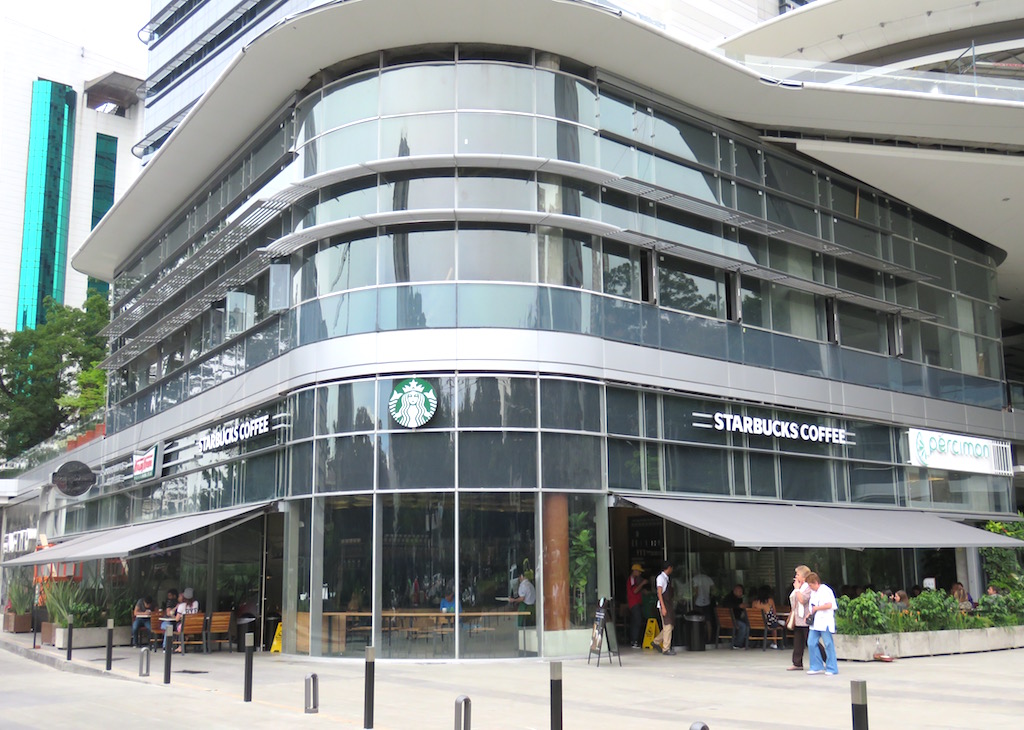

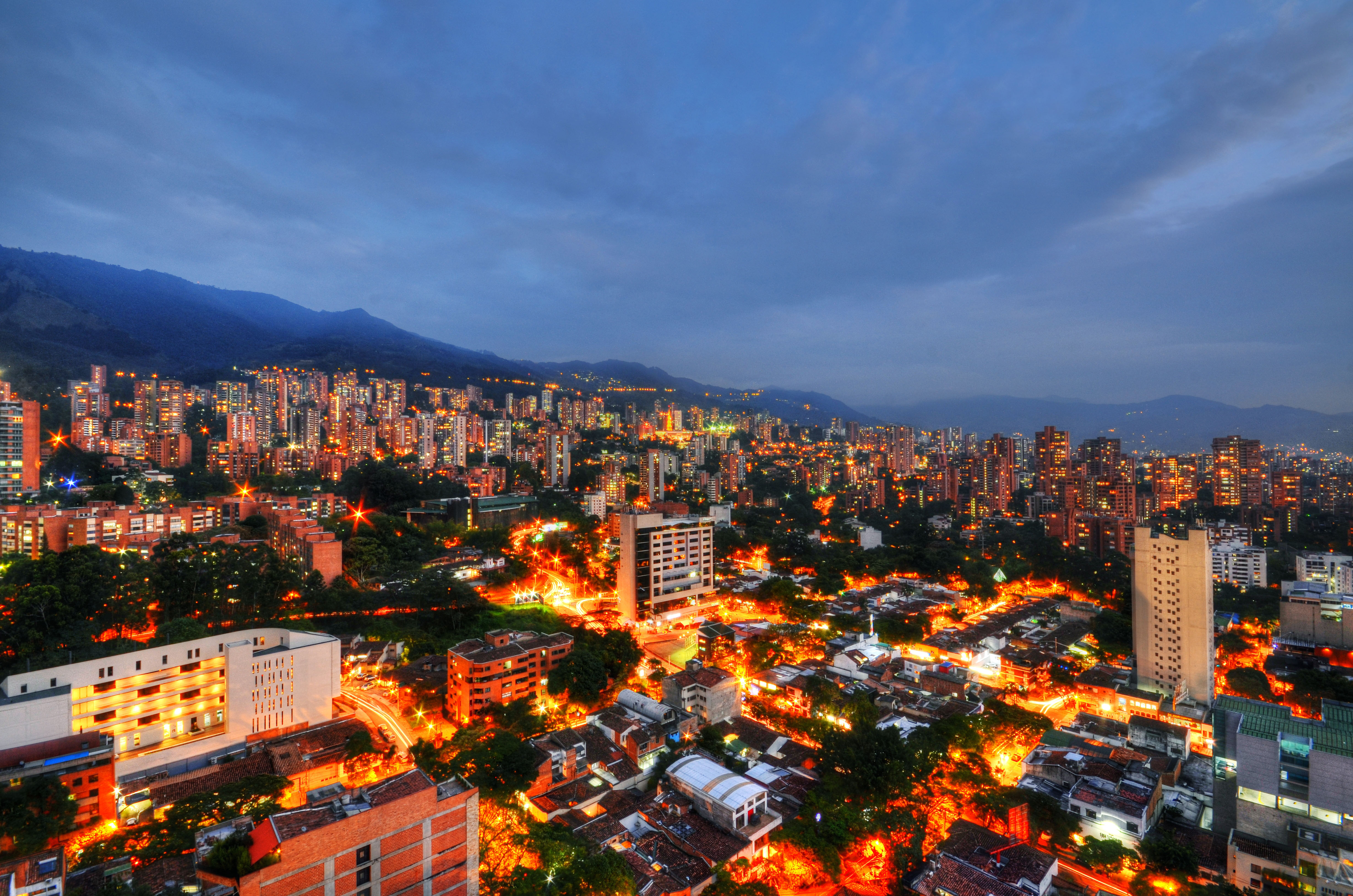

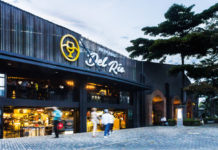






Seen the workers outside on Saturday, looked like an orientation. Been to Krispy Kreme couple of times, always empty, worker stated real slow. Hope both can make it being so close to each other.
I live around the corner of the new store and I got the impression that the large number of customers on the opening day were paid crowd media. What a massive disappointment it was to see a Starbucks much less have to look at it everyday. The very last thing that Medellin needs is more corporate encroachment from the USA. Bad enough it’s next to KrispyKreme and across the street from a Hard Rock Cafe. Close your eyes for a moment and you can transport yourself to Paramus, New Jersey.
I personally see this as a good thing. Starbucks is selling 100% Colombian coffee in its stores here in Colombia and they employee Colombians so they are supporting the local economy. The fact that Starbucks chose to enter the market is Colombia two years ago is because Colombia has a growing economy and is underserved with upscale coffeehouses. Starbucks was already a big coffee buyer in Colombia so why not also sell coffee in Colombia. To continue growing Starbucks has to expand in international markets as the US market is saturated.
Medellín is a big city so there are many other parts of the city where you won’t see imported USA brands. Walk down Avenida Poblado in El Poblado and there’s now Starbucks, Krispy Kreme, Papa John’s, Hard Rock Cafe, McDonalds, Burger King… it’s like being in the U.S. Avenida Poblado is also known as Milla de Oro (Golden Mile) for a reason – $$$ – and that’s why these imported places chose this location. El Poblado is a wealthy neighborhood that offers more of a Western lifestyle, but there are many other neighborhoods in the city that offer a more local lifestyle.
All good points Jeff. I personally decided to leave the US because I needed a serious break from the relentless capitalist machine. Starbucks is a decent company in many respects, but I came here looking for new ideas.
You are correct, Poblado is the area of the wealthy, but it is getting out of control.
Every time I travel to Medellin,I stay in Poblado, and I am starting to notice the prices are going up fast. Friday and Saturday night all the restaurants in La Strada center were empty,(might of been the Americanized menu along with the price). In the 6 years I have been going to Poblado, I never paid 22,000 for a glass of Rum Medellin and coke until last week. The only place that was packed on both nights was Papa John, cheap pizza.
I tend to agree with John,my plan is to retire in Medellin to see and live among a new culture and a new way of life. I hope what is happening in Poblado does not spread over to other parts in Medellin.
While you will see some USA brands in other parts of Medellín such as McDonalds, Subway, Burger King, KFC and Domino’s – it’s nothing like you will find in El Poblado.
In other parts of the city the USA brands are primarily found in the shopping malls. For example in Sabaneta, you will find KFC, Subway and Domino’s brands in the very large Mayorca mall. Domino’s also recently opened another pizza place on one of the main Sabaneta roads to support shorter distance pizza deliveries in Sabaneta. But that’s it in Sabaneta and there are hundreds of small local restaurants, tiendas and bars for more of the local culture and lifestyle.
If you are looking for a new culture and new way of life, IMHO westernized El Poblado is not the best place plus it’s the most expensive neighborhood in the city to live. That’s why I have lived over six years in other neighborhoods.
My same thoughts. I’v been traveling to Colombia since 1991 and now live here for the last 6 years.
Fast foods created by America corporate has created fat people with health problems.
English is spoken more in the Parque Ileres area. It’s a dump site for drugs and whores. Back packers with dirty feet who don’t bath makes me ready to move.
Jeff, as always, merci beaucoup for sharing the news, but I have to agree with others: news like this are rather disappointing to most expats who come, or are thinking about coming, to Colombia in search of a new environment which we expect, and want to be, original first and foremost.
As you I am sure know very well, most people who come to live in Colombia do not really miss McDonalds and Starbucks or any other chain franchises, otherwise we’d never leave Seattle, Dallas, Chicago, Boston or Montreal.
Part of enriching one’s experience is traveling the world, living in various natural environments, and learn from that experience. Nothing can be more said than coming to Medellin, Budapest, Dublin, Zagreb or Kiev and see McDonalds and KFC and alike.
I do not have anything against McDonalds and KFC and alike, per se, but in my view they just do not belong in beautiful and diverse original cultures that are so rich and certainly unique enough to be just perfect on their own.
Also, Colombia as a whole, and Medellin in particular, has so many options for the local businesses to appear and thrive, to establish local, original paisa coffee shops, develop their own, originally Colombian, chains.
Finally, having McDonalds and KFC and alike in the most expensive neighborhood of Medellin is somewhat ironic – these fast food chains are not exactly your exclusive chef suit and tie style restaurant.
I hope local people get over these alien corporate implants like people in certain East European countries have got over it and returned to their original selves. I think it serves us all, North Americans and others, just well.
I think its funny to see expats up in arms when these U.S. brands come to a foreign location like Medellín. The bottom line is you have a choice to frequent these U.S. brand locations or not, just like Colombians do.
If you go to a major city in a foreign country it’s rare not see truly global companies like McDonalds, KFC and Starbucks. The companies are experiencing faster growth in international markets than in the U.S.
McDonalds is in over 100 countries and about 75 percent of the company’s revenue comes from outside the US. McDonalds already has over 65 restaurants in Colombia. KFC is another truly global company that is in over 110 countries and it already has more restaurants in China than in the U.S. KFC plans to have over 60 restaurants in Colombia by the end of next year.
Starbucks started its international expansion later than McDonalds and KFC but it is already in 65 countries and the company plans to have 50 coffee shops in Colombia by the end of 2019. These companies wouldn’t be here in Colombia and Medellín if there wasn’t opportunity and demand from Colombians.
Here’s a take on this from my Colombian wife’s aunt when I brought up U.S. brand restaurants in the city in a conversation: “At home we eat rice, beans, meat and arepas. When we leave the house we want to try something different. I’m happy that we have choices from the U.S. to try.”
Being a paramedics for 21 years I see what these type of foods do, high blood pressure, heart problems, diabetes and overweight issues .
I will counter what my Colombia wife stated and I tend to agree. This past visit we starting to see more overweight people than ever before. Is there a connection,only time will tell.
The only good what comes out from these fast food places is employment for the Colombian citizens.
Edit to 2nd paragraph – will counter to what your wife aunt said with what my Colombian wife and I saw this past visit, more overweight people than ever before, connection to fast good, only time will tell.
First of all I do not consider their offerings food, they are food like products, conceived by food scientists in laboratories and the majority of the ingredients are generally cooked in factories elsewhere. I’m sorry to hear from anyone that is considered acceptable eating. That to me is the naive part.
Secondly, corporate American capitalism is on a rampage to force its products wherever people have even a little money to spend: their shareholders demand it. In the wake of that local culture is definitely being eroded. Many expats are just sick of this monster machine, so we leave to find new and fresh local culture and stimulation free of the incessant drone of these brands that care very little about their customers once the sale is made.
The other day, a hot afternoon, I sidestepped a glazed Dunkin Donut that someone had dropped on the sidewalk. In all its chemical glory it refused to melt, even a little, into the concrete.
Demand from Colombians? I have been an advertising and marketing creative director for 40 years and I have been paid well to create demand. Nothing about these international franchises is about demand, it’s about forcing out competition and steamrolling the minds of consumers that this is a fabulous new and exciting alternative to whatever your local culture had to offer. Besides, you saw it on TV!!!
With complete respect, I would look in other directions if you want to find naïveté.
American fast food places don’t have a monopoly on fast food. There are plenty of Colombian fast food places as well. Frisby, El Corral, Jeno’s Pizza, Qbano and many more. These Colombian fast food chains look to be much bigger in Colombia than the international imports from the U.S. Fast food is now part of the culture in Colombia just like in the U.S. and the rest of the world.
I happen to like Starbucks and happened to stop by the new store in Medellin yesterday and there were several expats there and many Colombians.
But, they are Colombian entities. Refreshing if for no other reason than that.
Many Colombians appear to be happy to see Starbucks arrive in Medellín – over 4,600 likes and over 340 comments on Starbucks Colombia’s Facebook page – https://www.facebook.com/StarbucksColombia. The majority of the comments are positive, like:
“We are happy in our city to finally have arrived, and we welcome … Prosperity for the brand and the team!”
“I’m happy to have come to Medellin”.
“Welcome all brands that can support the country’s development”
“Light years in better service!. They have the delicacy to ask you if you like dark, what kind of milk you receive with a smile also do not have to wait that long.”
“Finally arrived your Frappuccino”
And several are asking when there will be a Starbucks in other cities like Cartagena, Barranquilla and Cali.
Comments on Facebook, seriously…Is there a shred of reliability with comments on FB?: purchased. Crowds at the store: purchased.
Imagine how happy Colombians will be when Walmart, Denny’s, and so many other low class brands land here. I hope I see some White Castles popping up around town. At least someone had the backbone to help make Uber illegal (many of their drivers have no idea where they are going and are scared stiff if you sit in the back).
Colombians will soon get the benefit of not having to worry any more about the difficulty of obtaining a USA travel Visa… They will be getting the full experience of the USA without leaving the comfort of home. Yes, Colombia a fertile marketplace and it is in the process of being plowed. Sorry, obviously I feel strongly about this; it’s part of the reason I am here…
Jeff, thank you for sharing. If I may to share this: My close friend used to work for a company that handled various promotional campaigns and hired people specifically to write comments, reviews, and “like” certain products on the social media for remuneration. Some of their employees, largely hired from recent graduates, suffering from unemployment and underemployment, handled over 300 “unique user accounts”… Unfortunately, at this time we live in everything has been turned into a marketing tool.
Of course, it does not mean that there are no truly unique “likes” and comments. I believe that many Colombians do like this new “Starbucks”, even if out of curiosity. I am sure we all remember many newspaper articles about how when McDonalds opened their first restaurants in Eastern Europe at the end of Cold War locals formed queues longer than 1 mile just to get inside those restaurants. Those good folks were genuinely curious, to them getting inside that restaurant was almost like “visiting the US” experience.
Of course corporations will continue their expansion, this is in their nature. Of course it has a positive side – locals get hired, local suppliers have more business, it all adds to the local economy. But personally, I would prefer to see these corporations to “localize”, to become more local rather than push American cookie cutter standard model approach everywhere they can reach.
I’d rather see corporations investing in the development of local businesses including chains – not just buying some of local businesses out to destroy as competitors (no matter how insignificant), not buying some other local businesses and turning them into yet another “Starbucks” or “McDonalds”, but to feel their unique soul, let them be, let them develop into their own chain, under the unique name, with unique products, serving both locals and expats.
Just from my own experience, I can attest that I had much better coffee, and with character, from small papa-and-mama run shops in small town Italy, France and Germany than in a “Starbucks” which I, as any other person in North America, could not possibly escape. I am sure you and other readers of your excellent blog had similar experiences be it with a poutine dish from a small local place in Quebec or pizza from a small local place in rural Italy or with a bowl of red borscht soup from a small local restaurant in Ukraine.
Do we really want Colombia and other parts of this breathtakingly beautiful and diverse world to become no different from how America looks, where you go from town to town and you can not tell a difference – same gas stations, same fast food restaurants, same shopping malls… We all know that this is how America got developed, all this was built on an empty space, literally, but – Do we think that locals around the world would want it to happen to their own unique and already formed cultures, no matter how “underdeveloped” some of us may see them?
We all know the answer for that: Despite many locals may genuinely like another “Starbucks” added to the environment, they see it as a positive change because it’s “something new”, they want to try it, and that’s absolutely understandable and fine, but talk to them more – no they don’t want their rich and unique cultures, even if they are seen as “underdeveloped” by large multinationals, to be turned into something resembling those small American towns one cannot tell apart from one another.
Personally, I would like to see more diversity in the restaurant scene in Medellin, but what I mean is more Japanese, various kitchen style Chinese and Indian, of course uniquely European restaurants – Portuguese, French, Italian, German, Czech, Greek… whatever else unique and full of soul and tradition this beautiful world can offer.
But more “Starbucks” or “McDonalds” and alike?.. Thanks, but no thanks. From what I hear from my Colombian friends – they tend to agree with me, and I know this is not just because they are very friendly, sweet and polite people.
Good comment Jeff. I don’t use Facebook or patronize any of the businesses mentioned here so I am not a shill for anyone. It is true that comments can be rigged but to assume with no supporting evidence that the ones about Starbucks are rigged is a rather dubious way to make a point. In my long experience with TripAdvisor, for example, I’ve seen numerous articles telling the tale of a rigged system. I took the time to learn how to use it and have planned numerous international trips with it, very successfully too so I am a bit skeptical about the presumption of guilt. Why not just take your business elsewhere and allow those who like a place to go there in peace? That approach works for me. As I mentioned, I don’t patronize any of them not because they are symbols of a garish culture but because I don’t enjoy what they sell. As we say down on the corner “Nothing personal, just business”.
Geoffrey, I guess the point is that when it comes to large corporations with departments that do nothing but plan and execute marketing campaigns, including of course on social media, on daily basis, such “likes” on Facebook should be at least taken with a grain of salt. Often, questionable activities get outsourced to smaller contractors who are asked for results only and, you know, never questioned about their “business model”.
If it was a small papa-and-mama run coffee shop, I personally would not be suspicious because nobody but those very papa and mama plus family and friends would have possibly been interested in promoting their business and nobody but locals who like it (or come up with come constructive critique) could have been interested in sharing their experiences.
But knowing for the fact how the system works when it comes to “usual corporate practices” – not in this case necessarily, but in general, in our modern times – I just cannot accept Facebook “likes” as an indicator of real popularity. I agree it may not all be rigged, but when it comes to large corporations which spend millions and millions of dollars on promotions, depends on these promotions to continue to grow and to report back to their shareholders – this is a very different story. This is nothing really to argue here, just google something like “get paid to like and follow” and see for yourself.
Also, corporate expansions like this bring up concerns about fairness: clearly, it is much easier for a large multinational to open up shops than for a local family. It does not mean that local coffee shops are not around, or that they will all run out of business now. It only means that corporate expansions like this make it increasingly difficult for local businesses, will eventually run many of them to the ground, and just like elsewhere, it will result in locals becoming, slowly but surely, increasingly anti-American.
Thanks for the civil response. If the presence of these offensive hegemonic behemoths engenders anti-American feeling then folks won’t go there will they? Problem sorted, the places will go belly up.
Geoffrey, somebody will always go there, even if out of curiosity, once or twice. Or with their American friends, out of politeness. I am sure you know that as well as all others here.
But you will probably never ever find a local, anywhere in the world, who frequent McDonalds or Starbucks. Outside North America, no matter where in the world you go, over half of patrons inside these establishments are Americans, accompanied by their polite local friends who praise everything but think about getting out of that junk food joint as soon as possible.
Anywhere I travel in the world I always met American expats frequenting places like McDonalds or Starbucks or dining exclusively in restaurants inside their hotels – of course, one of those Hiltons and Marriotts. I am not judging, not at all. But when they talk to me about their “international experience” I am laughing – cannot help it! 🙂
I respectfully disagree. Go to any of the 10+ McDonalds in Medellín and 90-100% of the customers will be Colombians – except perhaps at the McDonalds next to Oviedo mall in El Poblado. I have been to several McDonalds in Medellín over the past 6+ years where I was the only expat customer at the time. Go to the McDonald’s in Los Molinos mall in Belén if you don’t believe me. I lived next to that mall for two years and only saw expats a few times. In Colombia with a growing middle class (like many other countries), it can actually be a status symbol to be seen eating at a McDonald’s.
I talked to the manager of the new Starbucks store in Medellín and they estimate that over 80% of the customers will be Colombians – similar to their existing 10 coffee shops in Bogotá.
With all due respect to everyone, I think we are getting off topic here. The original issue is not with the quality of the food: it’s mass produced inexpensive filler. The issue is not whether or not Colombians are customers: they are. It’s inexpensive and different.
The issue, for me, is that the very definition of an expat is someone who leaves one place for another. Why? Many have come to Colombia to escape the rolling thunder of capitalism and USA corporate greed. Colombians can do whatever they want to with their country, but I for one, came here to get away from the incessant hammering of all those bullshit brands. As “pretty” and “cool” as Starbucks is it is just another member of that group which includes all the usual suspects. I do not intend to patronize them. I do not want them to patronize me.
For me, the bottom line is that I just even have to look at the glaring corporate identities whenever I pass by them.
I do not want to be reminded of “home” and the reason I took such great pains to close one life and open another, in search of an environment free of the familiar. A fresh experience, where the constant drumbeat of corporate America does not incessantly follow you and from which there is practically no hiding.
I spent many years developing and managing brands and their dissemination and there is just very little authentic about it. It’s not evil, per se, but the goal is always to rout the competition big or small and it’s never a fair fight and losing is simply not an option. And, they almost never do lose…
I, for one, would be much happier to stand outside on the street and have a unique cup of coffee and an arepa con queso, sin internet, than feel I was being “trailed” all the way down here in South America. And, now, we can expect five more? Geat! If you see any dislikes on the FB page of Starbucks, I guarantee you that at least one of them is real.
* “trailed” all the way down here in South America by a pre-packaged experience. Please forgive the late correction to my own post. 😉
The expats and their much younger prepagos can enjoy a taste of home now. Tourism is on the increase in Colombia. You can see it everywhere. I always crack up when I see the bald, middle aged American with a young chicka from the barrio wearing a belly shirt. They simply dont understand how crazy and pathetic they look. The American just understand that she’s got a Sancho that she see’s every weekend while the American thinks she is visiting her family. At least now he can continue to lie to himself while drinking Starbucks.
John points out that many Yank expats will have left the States to escape rolling thunder capitalism and corporate greed. My experience in many Latin American countries bears that out. However “many expats” is not necessarily the majority. My reasons for hitting the expat road had very little to do with escaping stuff. I almost always worked for corporations and the venal motivation and thinking on the part of capitalist enterprises as described above is not what I saw. I’m positive it exists mind you, but it’s not what characterized my working life. Mostly what I saw was men and women doing their utmost to excel, compete effectively, keep the doors open, play by the rules and have payroll ready for that long line of employees on Friday who had kids to feed. It’s a good thing. I studied business owners carefully looking for common denominators of behavior and one quality stood out; they were able to keep their cool and remain emotionally mature under pressure. As to Starbucks, aka the real topic here, I don’t like their coffee so I don’t go there. If others like it then that’s fine with me. Life ain’t that complicated for me.
Leaving the States to “escape rolling thunder capitalism and corporate greed” as John described would probably best be described by Internations as “The Greener Pastures Expat, which only represent 21% of the 14,000 expats they surveyed in survey results I saw recently. All the categories of expats according to Internations include:
1. The Greener Pastures Expat (looking for a better quality of life) – 21%
2. The Foreign Assignee (sent to foreign country by employer) – 16%
3. The Adventurer (searching for an adventure or personal challenge) – 12%
4. The Career Expat (found a job in a foreign country on their own) – 9%
5. The Romantic (moved for love) – 9%
6. The Traveling Spouse (moved for partner’s job or education) – 9%
7. The Dream Destination Expat (always wanted to live in this particular country) – 7%
8. The Foreign Recruitee (recruited by a company in a foreign country) – 6%
9. The (Ex-)-student (moved to go to school/university) – 6%
10. The Family Expat (moved for family reasons) – 6%
Here’s the expat types: https://inassets1-internationsgmbh.netdna-ssl.com/static/bundles/internationsexpatinsider/images/2015/infographic/infographics_types_of_expats.jpg
So there are 10 different categories of expats and some expats I have met fall into multiple categories.
I think The Greener Pastures Expat is the most likely type of expat to complain about a Starbucks opening – the topic here. I personally like Starbucks and like having another choice here in Medellín. I went to the new Starbucks yesterday and it was pretty busy with mainly Colombian customers.
As a frequent visitor to Medellin, I am mildly annoyed to see the proliferation of American brands all over town, but I also understand the economics of local jobs. I may not patronize these places, but I am pleased to see people working that might otherwise not have a job. As with any purchase choice, you can either go in or walk on by. I like to contribute to the local economy and try to buy locally sourced products as opposed to the “Brand Name” items. Look inside, for example, the labels of most major brand clothing. You will see it’s origin in some off place. When you overpay for name clothing, you wonder where the profit goes, certainly not to the poor worker assembling the fancy item.
I have walked by this new Starbucks in Medellín many times over the past several months since it opened and it’s fairly busy at all hours so it looks to be successful.
Hi. I have stumbled upon a nice article of a thinker named Cody Delistraty and it reminded me some of the comments here and my own thoughts regarding big North American brands spreading into Medellín. Some may find it provoking.
“This is what frustrates people so much when they see McDonalds popping up next to the Moulin Rouge or a Starbucks next to the Louvre. It’s not so much the degradation of French gastronomy or coffee culture that tightens britches, but it’s the fact that it’s the erasing of escape routes, the destruction of places that were once exotic and different from where we came.”
Full article –
https://delistraty.com/2015/01/31/loneliness-or-freedom-the-existential-conflict-of-the-modern-expatriate/
Beautifully stated. Sad but accurate…